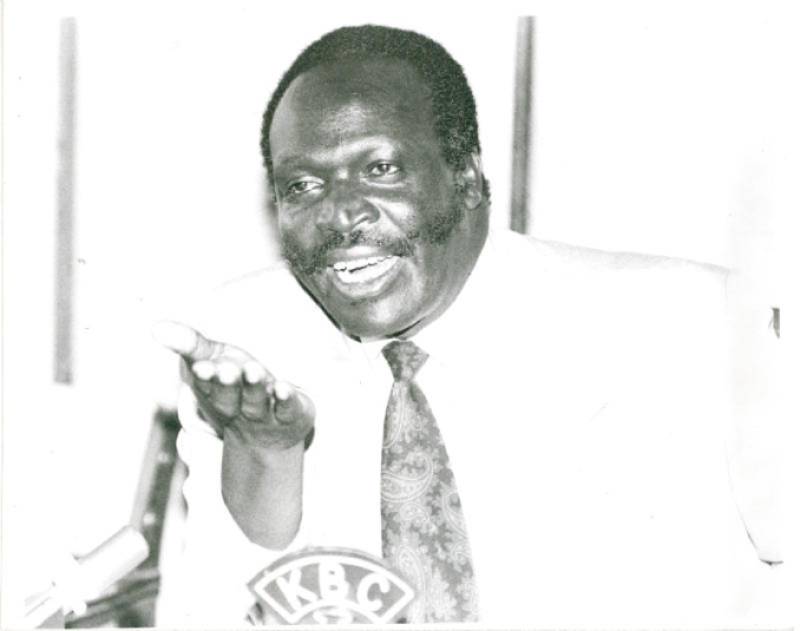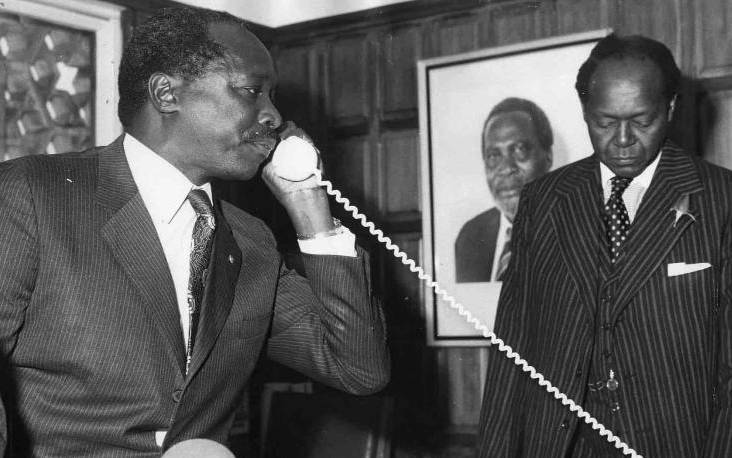
To avoid the humiliation of being fired from the Cabinet, Kones surrendered his ministerial flag and official limousine at the Mau Summit General Service Unit post located on the Nakuru-Eldoret highway but the officer-in-charge refused to accept them. [Archive, Standard]
They came in all shades, miens, moods and backgrounds. From suave intellectuals, such as Kenya’s fifth Vice President the historian Dr Josephat Karanja, to the simple politicians hoisted from rural Kenya to the skyscrapers of Nairobi and more significantly, dizzying positions of power where their word was the law.
It would be good when it lasted. Tragedy was then they fell foul of their boss and back to the grass it was. Sometimes through a terse 1pm KBC news bulletin.
That was a familiar feature of President Daniel arap Moi’s cabinets whose vicissitudes are captured in Moi Cabinets, Drama, Intrigues, Triumphs by The Kenya Year Book and whose excerpts The Standard presents, walking you through the ups and downs in the lives of politicians who sat on Moi’s council of ministers.
But who was the man behind the Cabinets?
Daniel arap Moi served as the third Vice President Kenya, taking over as President in 1978 despite concerted efforts from a group of Government officials and politicians determined to ensure he did not become President.
Few people know that at one point, as the opposition towards him turned to harassment, the VP drafted a letter of resignation. But before handing it in, he went to see his boss, President Jomo Kenyatta to share his tribulations.
According to Andrew Morton, author of Moi’s biography, The Making of an African Statesman, Kenyatta asked him, “Who is in charge of the police?” At the time, Moi was also the Minister for Home Affairs, so the police force fell under his docket.
In essence, the President was instructing him to deal decisively with the matter. Had Moi resigned, Kenya’s history would have been drastically different.
Once he took over as President, Moi promised continuity in the footsteps of Kenyatta under the new clarion call, “Fuata Nyayo”.
The new focus was a blend of three things: sound ethnic footing and clout, unquestionable loyalty to the ruling party, KANU, and well-defined old ties either in Government service or shared religious and political values.
In a bid to understand Moi and how he picked, related with and managed his Cabinet, the publication relates real-life anecdotes, some of which have not been told before.
Take the case, in the late 1990s, of Kipkalya Kones, a Minister in the Office of the President.
Kones was convinced Moi was about to fire him on the basis of rumours that the President was holding regular meetings with his main rival in Kipsigis politics, John Koech, who he had replaced in the Cabinet.
To avoid the humiliation of being fired, Kones surrendered his ministerial flag and official limousine at the Mau Summit General Service Unit post located on the Nakuru-Eldoret highway.
Although it is not clear exactly what transpired, Kones left neither the flag nor the official car at the station.
Journalists later learned that the station commander declined to receive the two symbols of office, arguing that he was neither the appointing authority nor the caretaker of State House property.
There was also speculation that Kones, in the course of consultations, received a call from his close friend, Franklin Bett, a State House official, who cautioned him that this was an act in bad faith because the flag belonged to the President at whose pleasure he served.
Handing it over to junior police officers on the roadside would therefore be seen as bad manners and disrespect. That was not how one quit Moi’s team; one needed to follow certain protocols.
Moi demonstrated his values and attributes through the way he related with members of his Cabinet.
For instance, those who arrived at his meetings late were shocked to be turned away with the warning that the meeting room was not a classroom.
Moi would be in the office from 5 am, and could not understand why anyone would arrive for a Cabinet meeting at 7:30 am. Ministers were also expected to have information about their ministries at their fingertips.
There was no room for guesswork, especially since the President always had the information beforehand.
Moi also towered above his ministers in the sense that he symbolised a higher vision for Kenya.
No wonder that even his harshest critic, Jaramogi Oginga Odinga, would early in his life write that the man’s vision was “… like that of a giraffe, he sees far”.
This statement captured the essence of a man who, in the 1960s and 1970s exemplified such a laid back and unambitious demeanour that he was dismissed as a “passing cloud”.
This same “passing cloud” was to become Kenya’s longest-serving President who left an imprint on every facet of life: education, healthcare, the Church and even national infrastructure.

President Moi and his one-time Minister for Constitutional Affairs Charles Njonjo who would leave the Cabinet in circumstances that wouldn't be described as amicable. [Archives, Standard]
Moi was a mild and unassuming administrator whose early training as a schoolteacher had indelibly stamped on his character such values as personal discipline and attention to detail. Not much else was known of Moi’s leadership style before history thrust him into the presidency.
As time went on, however, the picture emerged of a man with a crystal-clear agenda and no time to waste.
He became known for his low tolerance for fools and high expectations of total loyalty from those he appointed to deliver services to the citizenry. He made haste to cultivate the image of a man unafraid to roll up his sleeves and dive into the trenches.
His clarion call signalling his determination to follow in the footsteps of the development record set by the nation’s founding father gave rise to the Kiswahili nickname, Nyayo, a reputation that would stick throughout and beyond his presidency.
Cabinet ministers who worked under Moi came from diverse backgrounds. The tactical habit of basing appointments on political and ethnic considerations, as well as personal loyalty, was perfected during the Moi years and meant that there was a high rate of transfers within the Cabinet.
Although this so-called observance of “tribal arithmetic” or “ethnic balance” more or less evolved as the norm, all Cabinet office-bearers were expected to espouse the President’s freshly-minted philosophy of peace, love and unity.
The Nyayo Era was also a time when there was a scant line separating governance and politics; Cabinet ministers were drawn from among Members of Parliament and therefore had the very delicate task of carrying out their ministerial mandates effectively while protecting their party positions.
Here, again, the President loomed large as the unitary party boss, in whose good books everyone aspired to be, and understandably so since he made no secret of the fact that independent-minded lone rangers did not fit within his scheme of things.
This is not to say that the President made it difficult for his ministers to do their job; rather, they were aware that their actions — as far as carrying out their mandate was concerned — were closely monitored. Those who performed above par encountered few problems and indeed were given room to achieve what they could and leave a mark in their sectors.
Conversely, those who misread the purpose of their appointments soon found out the kind of man they were dealing with — one who did not like to hear that Kenyans were being short-changed by any measure.
Moi Cabinets underscores the fact that a national leader, by mere virtue of his place in history, renders a service to humanity in different spheres that is invaluable and that must accordingly be appropriately acknowledged. Even though cabinets are made up of ministers, much of what they do is intrinsically informed by the beliefs, philosophies and thought processes of the appointing authority.
-Moi Cabinets is published in two volumes by the Kenya Yearbook Editorial Board
 The Standard Group Plc is a multi-media organization with investments in media platforms spanning newspaper print
operations, television, radio broadcasting, digital and online services. The Standard Group is recognized as a
leading multi-media house in Kenya with a key influence in matters of national and international interest.
The Standard Group Plc is a multi-media organization with investments in media platforms spanning newspaper print
operations, television, radio broadcasting, digital and online services. The Standard Group is recognized as a
leading multi-media house in Kenya with a key influence in matters of national and international interest.




